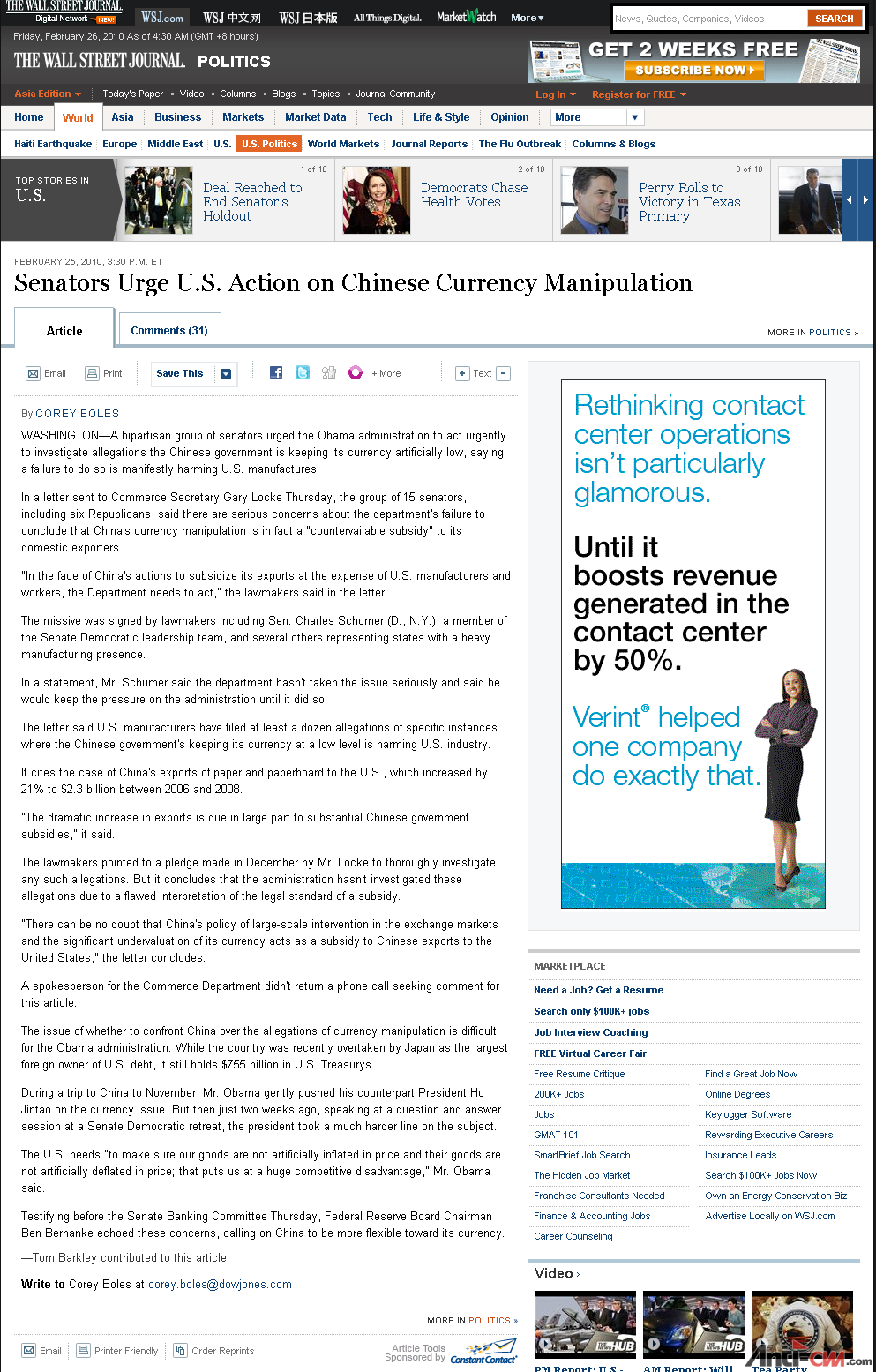|
|
Senators Urge U.S. Action on Chinese Currency Manipulation
http://online.wsj.com/article/SB10001424052748704479404575087592599575362.html
WASHINGTON—A bipartisan group of senators urged the Obama administration to act urgently to investigate allegations the Chinese government is keeping its currency artificially low, saying a failure to do so is manifestly harming U.S. manufactures.
In a letter sent to Commerce Secretary Gary Locke Thursday, the group of 15 senators, including six Republicans, said there are serious concerns about the department's failure to conclude that China's currency manipulation is in fact a "countervailable subsidy" to its domestic exporters.
"In the face of China's actions to subsidize its exports at the expense of U.S. manufacturers and workers, the Department needs to act," the lawmakers said in the letter.
The missive was signed by lawmakers including Sen. Charles Schumer (D., N.Y.), a member of the Senate Democratic leadership team, and several others representing states with a heavy manufacturing presence.
In a statement, Mr. Schumer said the department hasn't taken the issue seriously and said he would keep the pressure on the administration until it did so.
The letter said U.S. manufacturers have filed at least a dozen allegations of specific instances where the Chinese government's keeping its currency at a low level is harming U.S. industry.
It cites the case of China's exports of paper and paperboard to the U.S., which increased by 21% to $2.3 billion between 2006 and 2008.
"The dramatic increase in exports is due in large part to substantial Chinese government subsidies," it said.
The lawmakers pointed to a pledge made in December by Mr. Locke to thoroughly investigate any such allegations. But it concludes that the administration hasn't investigated these allegations due to a flawed interpretation of the legal standard of a subsidy.
"There can be no doubt that China's policy of large-scale intervention in the exchange markets and the significant undervaluation of its currency acts as a subsidy to Chinese exports to the United States," the letter concludes.
A spokesperson for the Commerce Department didn't return a phone call seeking comment for this article.
The issue of whether to confront China over the allegations of currency manipulation is difficult for the Obama administration. While the country was recently overtaken by Japan as the largest foreign owner of U.S. debt, it still holds $755 billion in U.S. Treasurys.
During a trip to China to November, Mr. Obama gently pushed his counterpart President Hu Jintao on the currency issue. But then just two weeks ago, speaking at a question and answer session at a Senate Democratic retreat, the president took a much harder line on the subject.
The U.S. needs "to make sure our goods are not artificially inflated in price and their goods are not artificially deflated in price; that puts us at a huge competitive disadvantage," Mr. Obama said.
Testifying before the Senate Banking Committee Thursday, Federal Reserve Board Chairman Ben Bernanke echoed these concerns, calling on China to be more flexible toward its currency.
—Tom Barkley contributed to this article.
Write to Corey Boles at corey.boles@dowjones.com

|
action, Chinese, currency, Manipulation, Senators, action, Chinese, currency, Manipulation, Senators, action, Chinese, currency, Manipulation, Senators
评分
-
1
查看全部评分
-
|